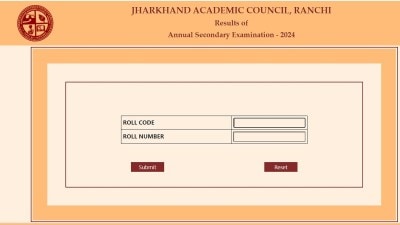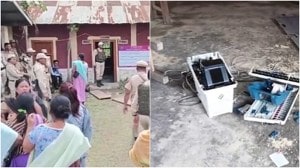- India
- International
India wanted to raid IC-814 in Dubai, but Farooq Abdullah opposed swap, says former RAW chief AS Dulat
A decade separated the two incidents but both times, A S Dulat, former chief of the Research and Analysis Wing (R&AW), had to face the wrath of then Jammu and Kashmir chief minister Farooq Abdullah over the release of wanted militants in the Kashmir valley. In his book Kashmir — The Vajpayee Years, published by […]
 Both times, it was Dulat, first as head of the Intelligence Bureau’s Srinagar unit and later as the R&AW chief, who was picked to placate the chief minister. And the experience, he writes, was harrowing.
Both times, it was Dulat, first as head of the Intelligence Bureau’s Srinagar unit and later as the R&AW chief, who was picked to placate the chief minister. And the experience, he writes, was harrowing.
A decade separated the two incidents but both times, A S Dulat, former chief of the Research and Analysis Wing (R&AW), had to face the wrath of then Jammu and Kashmir chief minister Farooq Abdullah over the release of wanted militants in the Kashmir valley.
In his book Kashmir — The Vajpayee Years, published by Harper Collins, Dulat writes that the first incident was in December 1989 when five militants were released in exchange for the release of Mufti Mohammad Sayeed’s daughter Rubaiya who had been abducted and the second was in December 1999 when Masood Azhar, Omar Sheikh and Mushtak Ahmad Zargar were swapped in Kandahar for the passengers of the hijacked Indian Airlines flight IC-814.
Both times, it was Dulat, first as head of the Intelligence Bureau’s Srinagar unit and later as the R&AW chief, who was picked to placate the chief minister. And the experience, he writes, was harrowing.
[related-post]
His conclusion: “…that General Pervez (Musharraf) had to have a hand in the hijacking. The reason one can say so with such certainty is that such an operation could not have been undertaken without ISI support…”
On the drama that preceded the release of militants for the IC-814 passengers, Dulat remembers how Farooq Abdullah rebuffed him: “You again… You were there during Rubaiya’s kidnapping. How could you come back again? I said then whatever you are doing is wrong, and I am saying it again. I don’t agree with it.”

“He (Abdullah) experienced waves of anger. He would calm down and then would start all over again. Calm down and start again. Then he was at it: how weak Delhi was, how big a mistake this is, what a bunch of bloody idiots, buffoons. It just went on and on and on… He then called up Jaswant Singh and give him an earful: “aap jo bhi kar rahe hain, galat kar rahe hain.” He called up others in Delhi. He kept banging the phone down… “I will not let this Kashmiri fellow (Zargar) go, he’s a killer. He will not be released.’’
The shouting, Dulat recalls, continued for three hours, after which the chief minister announced he was going to see the Governor, another former R&AW chief Gary Saxena, to hand in his resignation. It was 10 pm at night and the angry chief minister announced to the Governor: “These fellows want these terrorists released and I’ve told the RAW chief I won’t be party to it. I would rather resign and that’s what I have come to do. These bloody fellows don’t know what they are doing…”
The Governor, Dulat writes, handled the situation deftly. Out came a bottle of Johnnie Walker Black Label and Gary Saxena said, “Dr Saheb, you can’t throw in the towel so easily. At this point of time, there is no other option. This must have been thought of and discussed in Delhi, and if they’ve decided that there’s no other option, then we have to go along with it.”
The following morning, Dulat reveals, he was flying back to New Delhi in R&AW’s Gulfstream jet, with Masood Azhar and Zargar, both blindfolded and sitting in the back of the plane. The Foreign Minister and the third militant, Omar Sheikh, were ready for the flight to Kandahar.
“Jaswant was a very lonely man. He showed up in Kandahar for the swap, a lonely man on whom everybody who had felt frustrated in India with the whole incident, focused their frustration…”
The book mention another hitherto unknown fact about the IC-814 hijacking: while the plane was at the Dubai airport, India had contemplated a commando-raid, but local authorities refused to cooperate. “We tried to prevail on the Americans to put pressure on the UAE to allow us a raid, but India found itself isolated internationally. Nothing seemed to be going our way.”
He also describes a crucial 50-minute meeting of the CMG (crisis management group) on the hijack: “…the CMG degenerated into a blame game, with various senior officials trying to lay the blame for allowing the aircraft to leave Indian soil on one another; the Cabinet Secretary, being the head of the CMG was one target, and the NSG chief, Nikhil Kumar, unfortunately became another.”
Dulat has narrated how Farooq Abdullah also opposed the release of five militants as a swap for Rubaiya Sayeed. He had told an emissary: “How has it come from one to three to five (militants)? Even if it was my own daughter, I would not release them.”
Eventually, two cabinet ministers, I K Gujral and Arif Mohammad Khan, along with IB chief M K Narayanan, flew down to Srinagar and convinced him. Abdullah then said,”Okay, if you want to go ahead and release them, do it. But I want to lodge my protest.”
He recalls that the chief minister had clearly told them that if the government held out, Rubaiya would be released unharmed, without having to free terrorists. If the government caved in, it would burst the dam, and there would be no looking back for terrorists in Kashmir. “We will have to pay for it,” he told the ministers.
Twenty six years later, Dulat writes: He (Abdullah) proved right.
Apr 19: Latest News
- 01
- 02
- 03
- 04
- 05







































